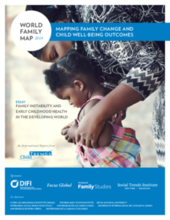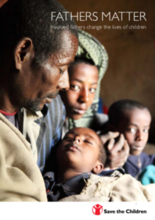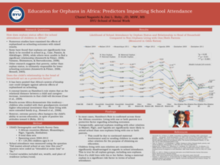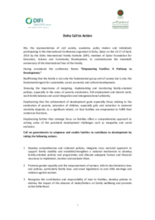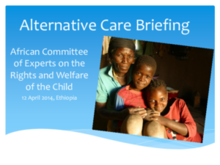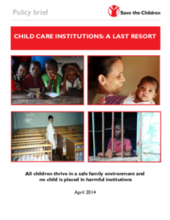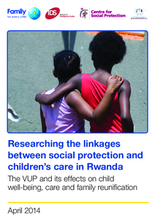Displaying 631 - 640 of 947
This study examined whether spanking by the child's mother, father, or mother's current partner when the child was 1-year-old was associated with household CPS involvement between age 1 and age 5.
The second annual edition of the World Family Map investigates how family characteristics affect children’s healthy development around the globe and includes a new essay focusing on union stability and early childhood health in developing countries.
This leaflet is a mapping of Save the children’s role and work in promoting the engagement of fathers. It presents some of the evidence of the benefits of involving fathers and some of the strategies used by the organization and others.
This powerful chart illustrates preliminary research findings using data from Demographic and Health Surveys (DHS) in 5 African countries (Malawi, Mozambique, Niger, Uganda and Zimbabwe) to better understand how orphan status affects the school attendance of children in Africa and the extent to which living in kinship care can act as a protective factor in this context.
This is a Call to Action issued by the Doha International Family Institute commemorating the International Year of the Family.
This presentation, produced by Better Care Network (BCN), International Social Service (ISS), Save the Children, and SOS Children's Villages, was given at a 2014 briefing of the African Committee of Experts on the Rights and Welfare of the Child (ACERWC). The objectives of the Alternative Care Briefing were to increase the understanding of and recommendations on the implementation of the Guidelines for the Alternative Care of Children when reviewing State Party Reports and drafting general recommendations and to create opportunities to promote the Guidelines for the Alternative Care of Children in its 5th anniversary.
Save the Children has released a policy brief outlining its position on the institutional care of children.
This report features the results of, and recommendations based on, a study conducted in Rwanda which investigates the links between the cash transfer program “Vision 2020 Umurenge Programme (VUP),” child well-being, and children’s care and family reunification.
This issue of the US-based journal Future of Children, entitled ‘Helping Parents, Helping Children: Two-Generation Mechanisms,’ reviews intervention programs for children and families of low socioeconomic status and on the mechanisms of child development that those intervention programs are trying to influence.
For this study conducted in and near Kampala, Uganda, 518 youth (8 to 18 years old) and their caregivers were interviewed individually, examining the association between relatedness and perceived food and work equity, and school attendance.

